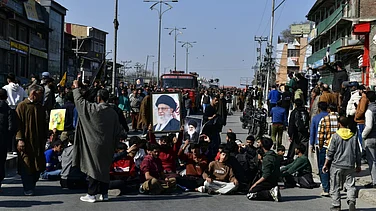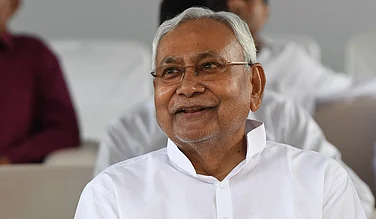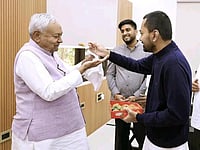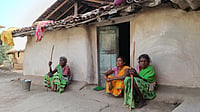“It was the year 2012-13 when I was studying in grade 8. My friends used to call me Naxalite. I never answered them as I was unaware of the meaning of this word. When I was in grade 12 at St Xavier’s, I understood whom one calls a Naxalite and why and why I was being addressed as one. Even today, when I get reminded of the words used by my friends back in school, I feel a lot of pain. How can one address a tribal as a Naxalite?”
These are the words of 25-year-old Aman Kachhap in a voice laced with pain. After realising the meaning of the word ‘Naxal’, his heart has been filled with sorrow. In the past five years, Aman has defined the meaning of ‘Naxal’ through his rap music. He has recently given his voice to the rap song.
The first-year student of Ranchi University, Aman is a tribal student. He had recently written a rap song titled ‘Haan haan Naxali’. Through the song, he has tried to address the issues of rights, freedom, water, forest, land, and democracy. Written in Nagpuri language, he has given his voice to this song too.
Aman is not the only example of tagging the word ‘Naxal’ with a tribal. Human rights activist and author Gladson Dungdung exemplifies Aman’s work on understanding the mindset of society against tribals.
Dundung tells Outlook, “The term ‘Naxal’ has been attached to the tribal by the ruling class. This has been done for political mileage. Tribals have been fighting for the protection of natural resources for a long time and it has been difficult to control the same. Gradually, tribals were addressed as ‘Naxal’ and it was put in the minds of the people that tribals fighting for water, forest, and land are ‘Naxalites’. As a result, tribals were tortured, attacked, and murdered so that questions do not get raised as to why the innocent tribals were being subjected to such cruelty.”
Chhattisgarh and Jharkhand are still considered to be severely Naxal-affected states. Tribal names and faces are the most common among cases and arrests registered in the name of Naxals. However, there are reports of many innocent tribals being falsely implicated. On April 24, 2017, 121 tribals arrested in connection with the Maoist attack at Burkapal in Sukma district were acquitted and released on July 16, 2022.
According to Dungdung’s book ‘Endless Cry in the Red Corridor’, 2,000 tribals were killed in Jharkhand, Chhattisgarh, and Odisha during 2001-16 in the name of Naxalism. The same number of tribal girls and women have been raped. Citing several reports in the book, Dungdung has written that 2,70,000 people were arrested for being Maoists, most of whom are tribals. Gladson believes that 90 per cent of the tribal killed and arrested in the name of Maoism are innocent.
Let us get back to Aman. Why did he enter the field of rap? Answering this question, Aman first clears his stand on ‘Naxal’. “I feel that one becomes a Nexalite for two reasons. For some, it is a means to prove one's point and authority. For others, it is to prove their dominance. My rap on Naxalites is in no way meant to promote Naxal ideology. I have tried to explain to the society that if one talks about one’s rights, water, forest, land, then one is called Naxalite. If it is so, then yes, I am a Naxal,” says Aman.
Aman feels that youth today are taking refuge in social media to build their identity. He too wants to make social media platforms a means to promote his ideas. He does not only want to do a regular job to support his family but he has chosen rap as a medium to present his society and culture before the world.
Aman’s father is a class four employee and his mother is a housewife. He has a brother and a sister. He tells Outlook, “Tribals in Jharkhand need not learn music and dance. This culture has been imbibed in them since the start. Tribals sing songs in the typical Nagpuri language in the akhada. Through these songs, they express their happiness and anger. From here I learnt to catch the beat of music and play mandar-nagada (musical instruments). One can see that today’s youth connect more with the rap music. No wonder I want to write and create rap music in Nagpuri language and convey the tribal message to the youth.”
Till now, Aman has composed six rap songs. He has sung these songs too. They have been released and can be watched on social media. This includes ‘Haan Haan Main Naxali hoon’, ‘Jatra Lagao’, ‘Dhemni’, and ‘Basti Anthem’, all of whom are tribal-centric. Aman has been blogging in the Nagpuri language since 2007. During the first Covid-19 lockdown when he was at home for most of the time, he started writing rap songs. When there was a slight relaxation in the lockdown, the first rap song was shot. He says that he is writing more rap songs on tribals in the Nagpuri language.
According to social activists, Naxalism has been associated with tribals in areas of Jharkhand and Chhattisgarh where mines and minerals are found. According to information obtained last year through the Right to Information (RTI) Act by CPI(M) Jharkhand Secretary, Prakash Viplav, 704 cases were registered in Jharkhand under the Unlawful Activities (Prevention) Act (UAPA) sections during 2009-21. Of this, 52.3 per cent were registered against tribals, 23.1 per cent against other backward classes (OBCs), and 6.7 per cent against Dalits. It gives information that the highest number of 187 cases in the name of Maoists under UAPA have been registered in the West Singhbhum district of Chaibasa. Dumka has 57 cases and Gumla has 42 cases. The area of Gumla is known for bauxite. Chaibasa in Jharkhand, which has 40 per cent of the country's mineral wealth, has the highest iron ore reserves.
Ramchandra Ram, a retired police officer who wrote the book titled ‘Naxalwad Jharkhand ke jharokhe se’, tells Outlook, “Associating tribal with the word ‘Naxal’ is wrong. Some of the tribals have become Naxals under pressure, not of their own free will. Those who think that the tribals living in the forest are Naxalites are absolutely wrong. I have stayed with them. I have worked as a DIG, IG, and SP in Jharkhand. I have not experienced anything like this.”
(Translation by Kaveri Mishra)























